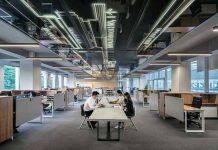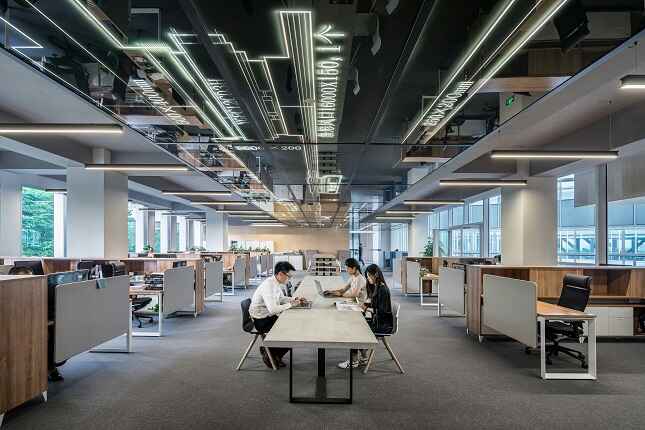Ready to have an office that actually grows with your business?
Every single business is going to come up against this problem at some point. Your team expands and you need more space. Budgets tighten up and you need to downsize. Work styles change and you need to reconfigure your entire layout.
The issue is that traditional offices don’t give you that option. You’re stuck in a long-term lease and have zero flexibility.
Here’s the problem:
Traditional offices are relics of the past. Designed for industries that aren’t as dynamic as today’s companies. As soon as your office space starts getting in the way of how your team works, you’ve got a problem.
Employees suffer and your entire business pays the price.
Enter modular office solutions. Spaces designed for businesses that need to scale up and down, change layouts, and adapt faster than traditional offices can manage.
Here’s what we’ll cover:
- Why Businesses Are Switching To Modular Offices
- The Cost Benefits That Actually Matter
- Different Types Of Modular Solutions
- How To Choose The Right Setup
- Implementation That Actually Works
Why Businesses Are Switching To Modular Offices
Modular office solutions are absolutely dominating the commercial real estate market right now…
And they are for one simple reason:
Modular office solutions actually work.
We all know that real offices are supposed to be set up and running within 3 months. Every single business has their own software needs that have to be considered when they’re using modular furniture. And for businesses on tight budgets, moving to modular office furniture has to save them money somewhere.
Companies like KABTech USA have been at the forefront of creating customizable modular office solutions that allow businesses to design their ideal workspace without the headaches of traditional construction. These systems provide the flexibility to reconfigure layouts, add private offices, or create collaborative zones whenever your business needs change.
And if the growing popularity of these modular construction methods wasn’t proof enough, here’s one last stat to back it up.
The global modular construction market was worth $103.55 billion in 2024, and it’s only going to get bigger.
Now, that’s the power of knowing your stuff and providing an actual service that solves real problems. If you’d like to know more about what we do and how our solutions can help, we’re just a quick call away.
The Cost Benefits That Actually Matter
Before we dive any further, let’s talk about money.
Office construction is more expensive than you think. There are so many associated fees and unexpected costs and costs that pop up out of nowhere that it never seems to stop.
Modular solutions work differently though.
That’s why the savings are real:
- Reduced construction time
- Less labor
- Minimal waste
- Predictable budgets
If you can halve your office setup time and shave off 20-30% in costs, that’s extra capital right there. More staff? Better equipment? More growth?
Different Types Of Modular Solutions
This might not be common knowledge, but there’s more than one type of modular office solution.
Permanent Modular Construction
Permanent modular constructions are designed to last. They are constructed off-site and assembled on your property to create a permanent structure. It is the best if you need a long-term solution and don’t mind the customizations.
Relocatable Modular Buildings
Need flexibility in movement? Relocatable modules are for you. They let you take your office space with you. Perfect for businesses that may need to change locations in the near future or those managing temporary projects.
Modular Furniture Systems
We don’t always need a full building. Modular furniture and workspace systems let you redesign your existing office with configurable desks, partitions, and collaborative spaces.
The best part of modular design?
You can combine and match these approaches to best fit your situation. Start with furniture systems, then move on to relocatable buildings as you grow and expand.
How Modern Work Demands Flexible Solutions
55% of global occupiers now use flexible office solutions, and that percentage is increasing.
Why?
Well, because the way we work has changed entirely.
Hybrid teams need spaces that can support both in-office and focused individual work. Remote workers need occasional meeting rooms. Project-based teams need spaces that can adapt to current requirements.
Traditional offices can’t deal with this level of variance in requirements.
Modular solutions can though.
You can create dedicated zones for different work styles. Quiet focus areas, collaborative pods, meeting spaces, and break rooms. All within a flexible framework that you can reconfigure whenever team dynamics change.
And here’s the fun part…
Employee satisfaction matters more than ever before. Workers want comfortable, functional spaces that support how they actually work. Modular offices let you design for your people and not force your people to adapt to rigid layouts.
Choosing The Right Modular Setup
So how do you pick the right modular office solution for your business?
Start by taking a good look in the mirror. Don’t just think about today either – think about where you’ll be in 6 months, 12 months, and 2 years.
Ask yourself these questions:
- How often does your team size change?
- Do you need private offices or open collaboration spaces?
- Will you need to relocate or expand?
- What’s your realistic budget and timeline?
- Do you have any specific industry requirements?
Once you have clarity on these points, it becomes much easier to find the right modular solution for your business.
Work with providers that understand your industry. A tech startup will need a different configuration to a healthcare clinic. Manufacturing facilities have different requirements to creative agencies.
The best modular office partners will show you real examples of how they have solved problems like yours.
Implementation That Actually Works
This is the point where most businesses drop the ball.
They find a great modular solution and then rush the implementation process. Then they end up with an office space that doesn’t quite work because they missed some important planning steps.
Here’s what you should do instead:
Map out your workflow before you finalize your layout. How are people going to move through the space? Where are teams going to need to collaborate? Where do individuals need quiet time?
Plan your technology infrastructure too. Modular offices need to have access to proper electrical, networking, and climate control. Plan these early and don’t leave it to the last minute.
And don’t forget about future expansion. Build in room for growth so that you’re not redesigning everything in 6 months time.
The key?
Work with modular office providers that have done this hundreds of times before. They’ll spot issues you would never think of and save you from making costly mistakes.
The Sustainability Advantage
One last point worth mentioning…
Modular construction is way more sustainable than traditional building methods. The controlled manufacturing process reduces waste. Modules can be reused and reconfigured rather than demolished.
Businesses with environmental commitments will appreciate that.
You end up with a workspace that fits your needs without the massive carbon footprint of regular construction. And many modular systems are built with energy-efficient materials and designs that reduce your ongoing operational costs.
It’s a win-win.
The Bottom Line
Modular office solutions are giving businesses exactly what they want: flexibility, cost savings, and speed.
The market for these modular solutions is growing year on year because they provide real solutions to real problems. You can get professional workspaces without the headaches of traditional construction. You can adapt and reconfigure your office as your business grows and changes. And you save money at the same time.
To recap:
- Modular offices install way faster than regular building constructions
- You get the flexibility to change layouts at a moment’s notice
- You save money through reduced construction time and waste
- There are multiple types of modular solutions that suit different business needs
- Careful planning ensures your modular office implementation is a success
Whether you’re launching a startup, expanding an existing business, or managing a distributed team, modular office solutions are definitely worth serious consideration.
They’re not just a trend, they’re the way smart businesses are approaching workspace design.







































